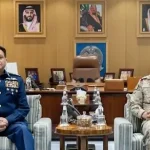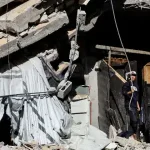ISLAMABAD: As the Supreme Court’s constitutional bench heard petitions against military trials pertaining to the May 9 attacks on army sites, the main focus of Thursday’s hearing was the legitimacy of military trials of civilians in light of Article 8.
The hearing on several Intra-Court Appeals (ICAs) against the October 23, 2023, five-judge ruling that invalidated the military courts’ prosecution of civilians was resumed by the seven-member constitutional bench, which is led by Justice Aminuddin Khan. The bench also included Justice Shahid Bilal Hassan, Justice Muhammad Ali Mazhar, Justice Syed Hasan Azhar Rizvi, Justice Naeem Akhtar Afghan, Justice Musarrat Hilali, and Justice Jamal Khan Mandokhail.
Justice Mandokhail questioned how a person prosecuted under the army’s discipline system, who was not covered by the Pakistan Army Act (PAA) 1952, could be denied fundamental rights protected by the Constitution. Justice Mandokhail pointed out that if regular civilians were included in its purview, it would negatively impact army discipline.
Justice Mandokhail questioned how the army act could be applied to someone who was not a member of the army, stating that army discipline would apply to someone in the military in the same way that the laws of the agriculture department would apply to someone working in that department. He pondered whether putting an unconnected individual under military discipline would not be against Article 8.
Justice Mandokhail queries how the Army Act may be applied to a civilian.
According to Justice Mandokhail, a civilian who murders a soldier will always face legal proceedings in a regular court; additionally, assaulting military sites is a felony that can be prosecuted under the Anti-Terrorism Act (ATA).
Defense Ministry attorney Khawaja Haris contended that the October 23, 2023, ruling in the civilians’ military trials was divided into two sections because it determined that Sections 2(1) d(i) and 2(1) (d)(ii) as well as Section 59(4) of the PAA were beyond the bounds of the Constitution and, as a result, had no legal force.
While Justice Muhammad Ali Mazhar questioned whether the five-judge bench had ruled that the PAA’s provisions were in conflict with Article 8 and what the reasoning was for this conflict between the Army Act’s provisions and Article 8, Justice Mandokhail noted that the entire case was centered around Article 8.
Additionally, Justice Mandokhail questioned how someone who wasn’t in the military could be disciplined by it. But the lawyer argued that civilians would be subject to military discipline if the law allowed it. The attorney argued that the PAA’s provisions could not be revoked by the court.
Justice Hilali questioned during the hearing if attorneys were permitted to participate in the military court trial and if the accused were given access to the full record. According to the counsel, all necessary documents and a lawyer were given to the accused in the military court.
In addition, Justice Hilali requested information about the FIRs filed against those responsible for the May 9 violence as well as the guidelines that govern civilian trials in military courts.
The hearing will be resumed by the constitutional bench on Friday.








